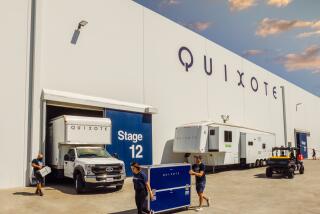Qintex in Receivership With $1.6-Billion Debt : Finances: The Australian firm, trying to stave off a breakup, is expected to sell its very valuable Monarch Beach property in Orange County.
- Share via
MELBOURNE, Australia — Qintex Australia Ltd., the media and property empire built by entrepreneur Christopher Skase, went into receivership Tuesday in an effort to ward off complete liquidation.
The cash-starved company, which has been in a downward spiral since its proposed buyout of the MGM/United Artists movie studio collapsed in October, asked an Australian court to place it in receivership to prevent the group’s foreign and Australian banks from breaking up the company.
The court appointed chartered accountants David Crawford and John Allpass from KPMG Peat Marwick Hungerfords as receivers and managers of Qintex Australia and 28 associated companies, stripping Skase of an operational role in the company.
Qintex’s debts now total $1.6 billion, and the company is expected to sell all its resort and property assets--including a highly priced, 230-acre ocean-front parcel in Orange County--while retaining its television network and perhaps its local television stations.
Qintex purchased the 232-acre Monarch Beach property from the Christopher B. Hemmetter and the Stein-Brief partnership last July for $132 million and at the same time took an option to buy the neighboring 115-acre Dana Headlands property for $115 million.
Local real estate experts considered the price extremely high, but Skase said he would be able to build a profitable luxury resort on the two properties. He expected to spend $1 billion developing the resort.
But Qintex earlier this month forfeited its right to the Headlands property when it missed an installment payment, and it now appears that the Monarch Beach property will be put on the block.
“What is certain now is that all the resorts will go, and all the land will go,” said Bryan Madden, director of research at Prudential Bache in Australia. Qintex owns two luxury resorts in Australia and the Princeville resort in Hawaii. Princeville announced Monday that the extensive renovation work under way at the site had been suspended.
Crawford and Allpass were given wide powers, including the right to hire and fire, sell Qintex assets and borrow money.
Peter Buchanan, a lawyer representing Qintex, told the Supreme Court in Victoria state that a receivership was necessary because it would enable Seven Network and other Qintex television stations to continue operating and thus retain their broadcasting licenses.
Madden said the receivership was akin to a Chapter 11 filing in the United States. The banks wanted to avoid a liquidation, he said, because a sale of all Qintex assets would cover only a bit more than half of the outstanding debts.
A spokesman for Qintex Entertainment Inc., a Beverly Hills firm that is 43% owned by Qintex Australia and has been in Chapter 11 since the parent company refused to advance needed cash following the aborted MGM/UA deal, said the firm now had “little contact” with Qintex Australia and still hoped to emerge from Chapter 11.
More to Read
Inside the business of entertainment
The Wide Shot brings you news, analysis and insights on everything from streaming wars to production — and what it all means for the future.
You may occasionally receive promotional content from the Los Angeles Times.









